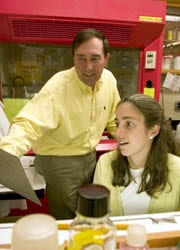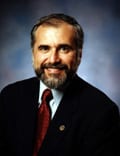WHOI to Host U.S. Commission on Ocean Policy July 22
July 19, 2002
Abrupt climate change, ships and ocean observatories, coastal management, biodiversity and genetics, hydrothermal vents and the deep biosphere will be among the topics discussed by Woods Hole scientists with members of the presidentially-appointed U.S. Commission on Five members of the Commission, including Dr. Robert Ballard, and Commission staff will be on hand to discuss many aspects of coastal and ocean issues in the Northeast. They will view posters and hear brief presentations on a number of topics affecting both the region and the nation, and briefly tour the village of Woods Hole. Commissioners are also visiting other locations in New England and New Jersey.
Based on the information gathered at the site visits, and subsequent public meetings, the Commission will be compiling recommendations for the development of a comprehensive national ocean policy to effectively preserve and utilize the world’s oceans and coastal areas and their resources.
The full Commission will gather July 23 and 24 at Faneuil Hall in Boston for public meetings on the wide range of ocean and coastal issues of concern to the Northeast region, from stewardship of fisheries and marine resources to the relationship among federal, state and local governments. Invited speakers represent local and regional government agencies and non-governmental organizations and include scientists, area businessmen, environmental organizations, citizens and government officials. Among those who will be addressing the Commission are WHOI Director and President Dr. Robert Gagosian, and WHOI Biologist Dr. Donald Anderson. Both will speak at the Science Panel July 23 from 4:20 to 6 p.m.
Dr. Gagosian advises the Ocean Commission’s Investment and Implementation Working Group, and is one of three WHOI staff members recently named to the Commission’s Science Advisory Panel. Dr. Kenneth Brink, a Senior Scientist in the Physical Oceanography Department and Director of the Institution’s Coastal Ocean Institute and the Rinehart Coastal Research Center, and Dr. Andrew Solow, Director of the Institution’s Marine Policy Center, will also serve on the panel. Members were chosen in consultation with the National Academy of Sciences; their duties include reviewing the scientific validity of all materials submitted to the Commission in order to ensure the Commission meets its mandated charge “… to give equal consideration to environmental, technical feasibility, economic and scientific factors.” The Science Advisory Panel will also provide advice, guidance and scientific information as requested by the Commission.
A news briefing is scheduled for 12:10 p.m. on Tuesday, July 23, at Faneuil Hall prior to the start of the public meetings. Commissioners will discuss the impact of federal, state and municipal ocean policies on businesses and tourism throughout the Northeast. Issues to be highlighted during the public meetings include ocean observing and prediction, science, regional coordination of ocean policy, public interest and marine industry.
The Northeast Regional meeting in Boston is the seventh of nine stops for the 16-member Commission, which is conducting similar site visits and public meetings in the nation’s coastal regions. To date, the Commission has heard from 250 witnesses representing many constituencies and areas of expertise. It will use the information received at the regional meetings to help develop its recommendations for a coordinated and comprehensive national ocean policy, as required by the Oceans Act of 2000.
After the Boston meeting, the Commission heads to Alaska and Chicago to conduct similar public meetings. The Commission’s findings and recommendations will be presented to Congress and the President in a final report in the spring of 2003.


